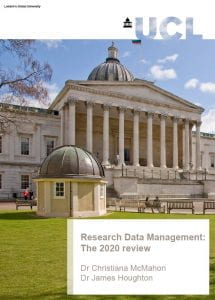Love Data Week – UCL’s Research Data Storage Service (RDSS) now open to external collaborators!
By Kirsty, on 12 February 2021
Guest post by James Wilson, Head of Research Data Services
Over the last year we’ve been making a number of improvements to the Research Data Storage Service (RDSS) to help researchers store and access their data in a way that better corresponds to how they work.
The RDSS is a managed storage service that helps researchers comply with funders’ criteria for good data management. It provides a storage space for research projects so that anyone involved in that project has a secure area in which to store and share files with their collaborators. Projects in the RDSS do not need to be formal, externally funded projects – they can be for personal research, or small unfunded collaborations between colleagues – but the service is well adapted for large projects with compute and multi-terabyte storage requirements.
That said, the service has had some limitations in the past which we have been addressing. The foremost amongst these was that you needed to be a member of UCL in order to use it. Increasingly, however, research is undertaken with collaborators around the world or in partnership with industry. Covid-19 has only accelerated this trend. We have recently added external collaborator functionality, enabling PIs to add external project members via a simple email invitation from within the interface.
We have also integrated the RDSS with UCL’s Research Data Repository – a platform that enables data and other non-traditional research outputs to be published, cited, and preserved over the long term. Researchers with a project registered in the RDSS can now move files, including very large files, across to the repository, along with contextual information.
As the volume of data in the RDSS grows, so we extend our capacity. We added an additional 600 terabytes of capacity during 2020, and will be adding a further petabyte of storage this coming term. The first terabyte of storage for any project is provided free of charge, with larger projects charged at £50 per TB per year. This gets you two copies of your data on disk in two different physical data halls at UCL’s Slough Data centre. A third back-up copy is saved to tape, and there is a 30-day retention period to help protect against accidental deletion.
Further information about the RDSS can be found at https://www.ucl.ac.uk/isd/services/research-it-services
 Close
Close







